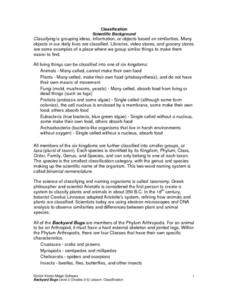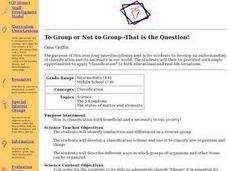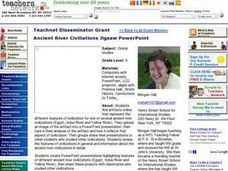Blogger
The Real Number System
Classify numbers into their groups with this graphic organizer for the real number system. The printable provides a space for all the categories, with a separate column for unreal numbers.
NOAA
Mud is Mud...or is it?
We know that the type of soil varies by location, but does the seafloor sediment also vary, or is it all the same? Scholars compare photos of the seafloor from two different locations: the Savannah Scarp and the Charleston Bump. Through...
Curated OER
Backyard Bugs
Explore the concept of scientific classification and the similarities and differences between plant and animal species. Your class will participate in hands-on activities by investigating dichotomous keys and classifying their shoes. To...
Curated OER
Science: Fossil of a Carbonized Plant
Learners classify leaves by shape and margins and use them to create models of plant fossils. By using paper over a leaf, they simulate fossilization of organisms onto sedimentary rocks. Following instructions on worksheets, students...
Curated OER
To Group of Not to Group - That is the Question!
Upper elementary and middle schoolers use their observation skills to group different kinds of candy by similar characteristics. They debate whether or not we should classify objects. Finally, they learn that biologists have developed a...
Curated OER
What's the Difference?
Young scholars analyze the similarities in different species. This instructional activity is part of a multi-segmented unit on the diversity of life. In this segment, students classify shoes to mimic the scientific categories of the...
Curated OER
"Investigating Soil Color and Texture"
Ninth graders will identify/understand the differences between soil and dirt. They will classify soil color accurately and use Munsell notation to describe it (Munsell books provided).Students will classify soil texture using the feel...
Curated OER
Properties
In this properties activity, students classify each of the properties given as either extensive or intensive and as either physical or chemical. This activity has 1 graphic organizer and 8 fill in the blank questions.
Curated OER
Hardware Sort
Students classify various hardware items using the attributes of the objects. In this classification lesson, students group objects based on their attributes and explain their classification key.
Curated OER
What Makes a Plant a Plant?
For a plant unit in your biology curriculum, here is a slide show that bestows the basics of plant structure, reproduction, and classification. The information is general. The main point of the lesson is to highlight what characterizes...
Curated OER
Reading the River
In collaborative groups, young ecologists measure the temperature, pH, and dissolved oxygen for three different freshwater samples. They examine each sample with a microscope and record observations on the microorganisms in the pond...
Curated OER
Variation in Human Skin Color
Students explore factors that control variation in human skin color and the implications of this information for human society. They understand that skin color is no longer considered a credible scientific standard by which to classify...
Curated OER
Design Explorations: Frieze Patterns
Students will explore frieze patterns. A frieze pattern is a mathematical concept to classify designs on two-dimensional surfaces, which are repetitive in one direction, based on the symmetries in the pattern. They will explore examples...
Curated OER
Matters of Milk and Marshmallows
Pupils observe a teacher demonstration o classifying matter by its physical properties of shape and size. After discussing the definition of matter, students describe the state of matter. They sing a song to the tune of "Bingo." In...
Curated OER
Ancient River Civilizations Jigsaw PowerPoint
Ninth graders use captions to determine an artifact's function and to list the features of a civilization. They classify artifacts according to the 8 Features of Civilization and for each Feature of Civilization they locate one artifact...
Curated OER
An Introduction to Primate Biology
Students examine why humans are classified as primates and what features they share with other members of the order. For this investigative lesson students divide into groups and complete their lab station.
Polk Bros Foundation
Assess with Charts: Compare and Contrast
If you're short on time and need a quick graphic organizer to help your learners connect history to the present, check out this resource. This worksheet can be useful for a visit to a museum or in conjunction with a reading assignment,...
Curated OER
Hardware Sort
Students work in groups to sort and classify a variety of hardware materials commonly found in the store. Students discuss attributes and explain their reasoning for different classifications.
Curated OER
Prairie Predator and Prey
Fifth graders brainstorm a list of animals that live on the prairie, and classify them as predators and prey. They conduct interviews where they ask the animals what they need to look out for to sustain life on the prairie.
Curated OER
Radio Program #3: Company Towns
Students analyze the characteristics of company towns. They locate former company towns on a map. Students classify the perspectives of residents of company towns. Creative writing unfolds within this lesson.
Curated OER
The Powers of Government
Explore the powers of the federal and state government. Learners use a Venn Diagram to classify tasks as belonging to the states, the federal government, or both. This activity provides a quick way to review these concepts.
Curated OER
A Tooth for a Tooth
Learners classify mammals as carnivores or herbivores. They look at a set of pictures of animal skulls, observing the shape and size of the teeth, and identify herbivores and carnivores.
Mr. Jones's Science Class
Periodic Table Project
Don't be fooled by the title; this is not really a lesson on elements. It is a project on classification, using the periodic table as an example. For that reason, it could be used in any branch of science. As an example, a group may...
Alabama Learning Exchange
Diverse Life Forms of the Ocean
Students recognize marine organisms and differentiate between plankton and nekton. In this investigative instructional activity students create a concept map using their list of terms and study marine life forms.

























